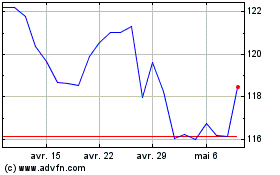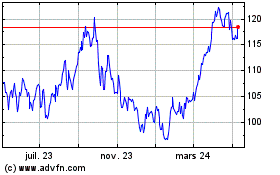WASHINGTON—President-elect Donald Trump will name Exxon Mobil
Corp. Chief Executive Rex Tillerson as his secretary of state, a
transition official said Monday. The veteran chief executive has
had extensive overseas business dealings, but his relationships
with foreign leaders could complicate his confirmation
prospects.
Mr. Tillerson was a comparatively late entry in the secretary of
state competition, but he impressed the president-elect as a
successful deal-maker in what one transition aide called the
"Trumpian" mold.
If confirmed by the U.S. Senate, Mr. Tillerson will be the
public face of a diplomatic approach that envisions more
cooperation with Russia and concessions from China on trade and
security matters.
Mr. Trump injected a bit of theater into what is normally a
staid and behind-the-scenes process, offering personal impressions
of the candidates and tweeting out his timetable for a
decision.
On Sunday, he tweeted that Mr. Tillerson is a "world class
player and dealmaker."
"Stay tuned!" he wrote.
Word of Mr. Trump's selection began leaking out Monday
night.
One of the finalists, 2012 Republican presidential nominee Mitt
Romney, wrote a message on Facebook that suggested he was out of
the running.
Mr. Romney wrote: "It was an honor to have been considered for
secretary of state of our great country."
In choosing Mr. Tillerson, the president-elect passed over
various campaign allies and established political figures. Among
those he considered—and rejected—were former New York City Mayor
Rudy Giuliani, one of his closest campaign advisers; U.S. Sen. Bob
Corker (R., Tenn.), the chairman of the Senate Foreign Relations
Committee; and David Petraeus, the former director of the CIA.
In the days after the election Mr. Giuliani was seen as the top
contender. But Mr. Giuliani, one of Mr. Trump's most loyal campaign
supporters, took himself out of contention on Nov. 29, Mr. Trump
said.
Mr. Corker was the most traditional candidate. The current and
previous secretaries of state, John Kerry and Hillary Clinton, came
out of the Senate.
Gen. Petraeus, a former commander of troops in Iraq and
Afghanistan, would have brought extensive military and intelligence
experience to the job. He was director of the Central Intelligence
Agency during the Obama administration. But Gen. Petraeus also
faced scrutiny of his 2015 guilty plea to a misdemeanor charge of
mishandling classified material in a case involving his biographer,
with whom he said he had an extramarital affair.
In addition, John Bolton, who served as U.S. ambassador to the
United Nations in the George W. Bush administration, was a
candidate with a background in diplomatic service. Also during the
Bush administration, Mr. Bolton served as the State Department's
counter-proliferation czar and focused specifically on the Iranian
and North Korean threats. Yet he's seen as one of the most hawkish
members of the Republican Party in recent decades, advocating for
the U.S. to bomb Iranian nuclear sites and opposing any diplomatic
negotiations with North Korea. He could have been at odds with Mr.
Trump on some issues, given the president-elect has suggested the
U.S. should pull back from overseas intervention.
Mr. Tillerson's nomination faces bipartisan resistance in the
Senate over his ties to Russian President Vladimir Putin.
His company has long done business in Russia. He has known Mr.
Putin since he represented Exxon's interests in Russia during the
regime of Boris Yeltsin. In a sign of the close relationship, the
Kremlin bestowed the country's Order of Friendship decoration on
Mr. Tillerson after he struck a 2011 deal that gave Exxon access to
prized Arctic resources and allowed Russian state oil company OAO
Rosneft to invest in Exxon concessions around the world.
Mr. Tillerson's past opposition to sanctions on Russia is likely
to trigger blowback among Senate Republicans, many of whom have
rejected Mr. Trump's more conciliatory stance toward the country
and its president. No Senate Republicans have yet said they would
vote against Mr. Tillerson. But a number of senators expressed
reservations. Sen. Marco Rubio (R., Fla.), a member of the Foreign
Relations Committee, the panel that would hold confirmation
hearings on the nomination, said in a tweet Sunday that "being a
'friend of Vladimir' is not an attribute I am hoping for" in the
next secretary of state.
Mr. Trump's secretary of state will have to navigate a host of
high-stakes foreign policy challenges across the globe. The
country's top diplomat also will be tasked with carrying out Mr.
Trump's vision for the U.S. role on the world stage, which is so
far not entirely clear.
A Trump administration will quickly have to contend with a
volatile Middle East. Military involvement by Russia and Iran to
boost the Assad regime in Syria has complicated the fight against
Islamic State. The next secretary of state would be at the
forefront of any negotiations with Russia on a resolution to the
Syrian conflict while also tending to U.S. allies in the region who
oppose the Assad regime.
Mr. Trump's approach to U.S. relations with Russia will be one
of his most closely watched moves, given his comments about Russian
President Vladimir Putin and U.S. intelligence assessment that
Moscow used cyberattacks to try to help Mr. Trump in the election.
Republican leaders in Congress recently have expressed deep
misgivings about any warming to Mr. Putin.
Mr. Trump also has signaled that he wants to implement a more
adversarial relationship with China, challenging Beijing on trade
and security measures. Mr. Trump's relations with China are already
off to a rocky start, with Beijing balking at his protocol-breaking
phone call with the president of Taiwan.
Mr. Trump will need China, however, in efforts to address the
growing threat from North Korea. China is seen as one of the few
countries in the world with influence over Pyongyang. President
Barack Obama told Mr. Trump that he believes North Korea is the
biggest foreign policy challenge he faces once in office.
He'll have to decide whether to adhere to the international
Paris climate change agreement and to continue with the
re-establishment of U.S. relations with Cuba. Both were among Mr.
Obama's top foreign policy initiatives and have drawn opposition
from Republicans.
Mr. Trump hasn't specifically said whether he will roll back the
deal the U.S. and other world powers reached with Iran to restrain
its nuclear program, though he has been a fierce critic of the
agreement. Israeli Prime Minister Benjamin Netanyahu has already
begun to put pressure on Mr. Trump to back out of the deal, while
Mr. Obama has tried to convince his successor that doing so would
be a bad idea. U.S. relations with Israel have been deeply strained
by disagreements between Messrs. Obama and Netanyahu on the Iran
deal and other issues.
Bradley Olson and Kristina Peterson contributed to this
article.
Write to Peter Nicholas at peter.nicholas@wsj.com and Carol E.
Lee at carol.lee@wsj.com
(END) Dow Jones Newswires
December 12, 2016 23:45 ET (04:45 GMT)
Copyright (c) 2016 Dow Jones & Company, Inc.
Exxon Mobil (NYSE:XOM)
Graphique Historique de l'Action
De Sept 2024 à Oct 2024

Exxon Mobil (NYSE:XOM)
Graphique Historique de l'Action
De Oct 2023 à Oct 2024
